When people tell you why they want to retire abroad, a few big reasons crop up again and again: the lower cost of living…escaping the worst of the North American winter…finding a more adventurous life…access to excellent, affordable healthcare.
But there are other benefits to embracing a life abroad—benefits most people don’t even think of. Many expats are pleasantly surprised to discover that you can also find a healthier lifestyle overseas—without even trying.
In many of the world’s best retirement havens, embracing a healthier lifestyle just comes naturally. And it’s easy to see why. With warm weather year-round, it’s easy to get out and about whenever you feel like it. Abundant fresh air fills your lungs with each breath. With everything you need within walking distance, many expats can get by just fine without a car. And those extra yards you walk each day add up to a shrinking waistline over time. Lower costs make it much easier to eat healthily, too. In our healthy havens, you can stock up on farm-fresh produce at the market…fish straight out of the ocean…and enjoy meat that’s not laced with preservatives, steroids, and hormones…all for a fraction of the cost of doing it at home.
All of which add up to a much healthier life. Today more than one third of U.S. adults are obese, according to the Centers for Disease Control (CDC), and that alarming trend shows no signs of abating. According to the CDC, the obesity rate among U.S. adults could reach 42% by 2030. Some 20% of Canadians are now obese, says Statistics Canada, and those numbers keep climbing, too.
Given these awful statistics, you’ll be glad to hear that, without fail, expats cite their improved health as one of the biggest benefits of moving overseas—many have shed weight without even making a conscious effort. And they have seen their stress levels spiral down as the tensions of North American living ease away. Low stress leads to a healthier, happier life. All of these factors have even seen expats wean themselves off medications they depended upon back home. Such has been the positive influence moving overseas has had on their health. And they didn’t have to go through any great effort to do it. They just embraced the kind of lifestyle these places let you live—affordably and easily—every day.
There are many places around the world where this effortlessly healthy lifestyle is just waiting for you to find it. Here are some of our favorites.
Healthy Habits Are Easy to Form in the Andes
By Wendy DeChambeau
“When I first moved to Ecuador, I weighed 350 pounds,” says Warren Sklar who lives in Cotacachi. “After being here for a few months, I started to lose weight, because of walking everywhere and eating healthier with all the fresh produce. I lost 40 pounds without even trying.”
Warren’s experience mirrors that of many expats in Ecuador, where healthy habits are easy to form. Though many folks move here for the nice spring-like climate, low cost of living, and interesting culture, they find that a pleasant by-product is better health. Here, living a healthy life just comes naturally.
That wonderful, steady climate of not too hot and not too cold means that you spend more time outside, exercising without even trying. There’s no need to hole up in your house during a polar vortex or run for the safety of an air-conditioned building on a sweltering August afternoon. So whether you like to run marathons or just enjoy a casual stroll in nature, the weather in most areas won’t be a hindrance. Most of Ecuador is perfect for getting outdoors.
In North America, most folks zip from errand to errand in their cars. But in Ecuador most expats (and locals) forego buying their own vehicle. Public transport is so cheap and convenient that most expats don’t need a car. So many people find themselves walking far more than they did back home. You can easily take a taxi or bus to most anywhere you need to go. But many find that if they’re only going a few blocks, they may as well walk.
Over time, all those extra steps add up. It’s very common in Ecuador to hear expats say they’ve lost weight, lowered their blood pressure, and/or experience better overall health. Michael Griffin came to Cotacachi three years ago. He has lost more than 55 pounds in that time, due to the lifestyle changes that Ecuador encourages. He says that, given the choice between fruit or French fries, he’ll take the healthy option.
“A mango is fresh, not frozen or fried. I’ve learned to enjoy that,” he says. And he’s given up the expense and stress of owning a car in favor of public transportation or his own two feet. “When you walk through town, you get exercise that you never would have gotten back home.”
In Vilcabamba, expat Colleen Thom says, “There are great hiking trails all around. When my husband Bill and I aren’t busy working on our house, we do an awful lot of walking. The scenery here is just unbelievable.”
While you’re walking, you inevitably find yourself stopping off at your favorite produce stand. Most towns have a large, official produce market, but you’ll also see plenty of fruit carts, kiosks, and small tiendas selling all manner of fresh fruits and veggies at dirt-cheap prices. Depending on the time of year, a dollar will get you five avocados, six large, sweet bell peppers, or 15 bananas. Small wonder you make a habit out of eating healthily.
Or you can grow your own, as Dennis D’Allesandro does in Vilcabamba. “I can’t tell you how much I thank God that I’m here,” he says. “In Pennsylvania we had to eat preserved or supermarket food during the winter. Here I can grow so many things all year round.”
All this fresh, locally grown food available year-round means that many expats eat more healthily here.
It’s easy to throw together a salad for two or a hearty soup when all the ingredients can be gathered up for just a couple of dollars. You can also take advantage of other people’s efforts, as Dennis D’Allesandro does at his little health-food consignment store. “People bring in things like mushrooms, goat cheese, and natural sundries,” says Dennis.
For me, one of the best aspects of life on the equator is the low-stress environment. Life moves slower here and people tend not to sweat the small stuff. Once you’ve gotten into the rhythm of this lifestyle, it’s easy to feel life’s pressures melt away. This is a huge benefit to people with stress-related maladies like high blood pressure and anxiety.
In Cotacachi, Kit and David Fuller found an unexpected benefit to their mental wellbeing. “There is a temperate climate all year and only a half-hour change in daylight over a 12-month period. Not dealing with seasonal changes does wonders for our attitudes.”
Stress-Free Living in Nicaragua
By Bonnie W. Hayman
“Before I moved to Nicaragua, my doctors had put me on all sorts of meds…to lower my cholesterol, my blood pressure, to thin my blood, and to take care of my asthma,” says expat Elizabeth Bastian. “One by one, I chucked my meds because I felt so good in Nicaragua. Now I’m prescription-drug free and all my readings are normal. Go figure.”
The irony of it all. The developing world…the developed world. There’s a big disconnect when it comes to health…and it’s the opposite of what you think. Low stress and good health often go hand in hand. And in Nicaragua, a low-stress lifestyle is hard not to come by.
Let’s compare the stress. The U.S.: Rush hour traffic or traffic in general…drinking contaminated water that the government supplies. More and more negative news every day. Everything so expensive. People losing their jobs every day…people who now may never be able to retire.
Now switch to Nicaragua: You may get rush-hour traffic if you’re late to meet someone for cocktails and there’s a herd of cattle in front of your car. Everything is close by when you live here; you really don’t even need a vehicle. You have your own well; you have your own fresh water from underground rivers. And very few of us listen to the news anymore.
“Things that bothered me enormously back home fall away much quicker when you see the ocean, hear the waves, watch the kids play football on the beach, and hang out with great people,” says Anne Pound who lives in San Juan del Sur. “So stress levels, even while working, are more manageable.”
Expats often say they didn’t realize how negatively stress affected them until they moved to Nicaragua and experienced a really calm and peaceful life. “I have no car here in San Juan,” says Pamela Wise. “I walk everywhere. I eat more fruits and veggies than I ever did back home, and much less processed food. There’s almost no stress in my life now. I lost 30 pounds in less than one year without doing anything extra.”
The outdoor life you find yourself living in Nicaragua inevitably lowers your stress levels. It’s warm and sunny almost every day. With coastlines on the Caribbean and Pacific, volcanoes, mountains, and large, scenic lakes, swimming and hiking opportunities abound.
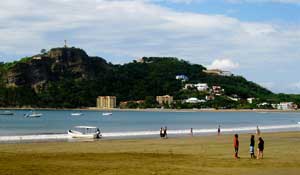
“At home, it is icy and snowy,” says Marion T. Moore. “Here, I walk nearly five miles every day. I go swimming regularly. The food is fresh and affordable, too.”
It costs a couple around $1,200 to $1,500 a month to live in Nicaragua, all in. Such low costs play a big part in making this a low-stress retirement haven. With no financial worries, you are free to enjoy every day as it comes.
The shortage of stress in Nicaragua is complimented by the abundance of healthy food here. “Free-range” in the U.S. only means that chickens live in larger cages. Companies treat farmed fish in regular supermarkets with antibiotics and chemicals to make them larger. You can find the good stuff, but you have to pay big bucks for it. In the States, an apple from the grocery store can sit in your refrigerator, and when you find it hiding in a back corner and eat it months later, it’s just as firm and crunchy as the day you bought it. Ever wonder why?
From the food perspective alone, you live more healthily in Nicaragua. Expat Justin Fahey, who also lives in San Juan del Sur says, “Fresh fish. Normal-sized, non-Schwarzenegger chickens. Decent veggies, excellent fruit. Outdoor lifestyle. Hot weather. I snack less and have better portion control. For me, it’s good to live in a place where I don’t have so many processed foods at my fingertips. I actually like having a low selection of products at the markets and supermarkets. Living here made me realize how unhealthy my diet was before we moved.”
Fresh, caught-that-morning fish is so economical in Nicaragua that people eat more of it. A pound of red snapper in the beach town of San Juan del Sur is about $2.87; last summer I saw it go for $34.95 a pound in Manhattan (and that was frozen, not fresh).
Chickens and cattle roam freely in the pasture in Nicaragua, something they used to do in the States before agribusiness got in the way.
“Fresh eggs, fresh bread, fresh lobsters, fresh fish, fresh veggies… No chemicals. What more can we ask for?” says expat Marion T. Moore from Michigan. A bag of cucumbers, carrots, red onions, a small watermelon, oranges, chia seeds, tomatoes, and avocado bought at a local Nicaraguan market may cost you no more than $5. Singles living here can eat on $25 a week.
Lose Weight Without Even Trying
By Jessica Ramesch
“We have dropped an incredible amount of weight,” says expat Armand Brodeur, who lives with his wife Joyclyn in Las Tablas, Panama. “And we’re not even eating as healthy as we ought to.”
The Brodeur’s story is not unique. They’re just two of the many expats who come to Panama and lose weight without even trying.
“I didn’t realize I was losing weight” is a constant refrain here. The outdoors beckon…there are produce stalls, fish markets, pristine beaches, and rainforest parks to visit. In much of the country, walking is the preferred method of transportation. So much so, that many expats here don’t even have cars. Imagine the effect on your waistline…
For me, zero winter weather means I never crave thick cream sauces, stews, or other stick-to-your-ribs fare. When you’re sitting on a sunny restaurant patio, menu items like grilled fish or lemony, cold ceviche are the most appealing. And if they happen to be healthier than your usual restaurant fare, that’s just an added bonus.
With year-round sunshine and mild weather, Panama tempts you outdoors everyday…forcing you to work off calories without even thinking about it. There’s so much to see and do (most of it outdoors) that no one wants to spend hours cooking. The Brodeurs discovered this when they moved to Las Tablas in 2014. Known as Panama’s Dry Arc, the Las Tablas region is known for bright sunshine and very little rain.
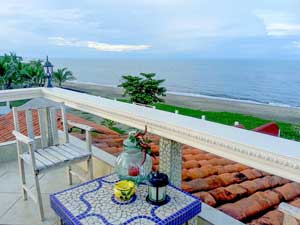
“With the hot, sunny weather, we don’t eat as much. I’ve dropped a whole size,” says Joyclyn. The Brodeurs do most of their traveling by foot, as many of the locals do. Though they weren’t necessarily trying to slim down, they did.
And it’s not just the great weather in Panama that lets you lose weight with zero effort. Eating healthier is easier to. Outside of Panama’s capital, you won’t find fast-food joints on every corner. Pot roasts and meat loaf give way to fresh, sushi-grade tuna, with exotic fruits for dessert. It’s hard to resist the fragrant mangos, papayas, pineapples, and bananas that grow all over Panama. Walk into any market—they are plentiful here—and you’ll see mounds of colorful produce costing a fraction of what you’d pay in the U.S. or Canada. “We have a papaya tree in the backyard and nowadays we have fresh papaya regularly for breakfast,” says Armand Brodeur.
Connie and Mikkel Moller live in the fishing village of Pedasí, where they grow all manner of good things right in their back yard. From aloe to papaya, they have it all. Surrounded by pristine, uncrowded beaches, the region attracts expats who enjoy world-class fishing or simply want to live by the water.
“The beaches here tend to be uncrowded, unlike those in Southern California, where I grew up,” says Connie Moller of her new life in Pedasí. “The water is warm and usually clear. Hearing and seeing the endless ocean always revitalizes me.”
Amid such serene surroundings, it’s no wonder so many expats see their blood pressure—and their waistlines—drop after moving to Panama.
An Active Lifestyle Comes Naturally Here
By Nancy Kiernan
Every Sunday and holiday, cities across Colombia—Medellín, Bogotá, Cali, Santa Marta, and others—close down large segments of the main streets to motorized vehicles. Between 7 a.m. and 2 p.m. these roads become pedestrian streets for walkers, joggers, cyclists, and roller-bladers.
This is called ciclovía. And it’s just one example of the active, outdoor lifestyle you can have in Colombia, thanks to the year-round wonderful weather.
My husband Mike and I have lived in Medellín for four years. “I walk so much more now than when I lived in Maine,” says Mike, who attributes his 40-pound weight loss to being more active and eating healthier food here.
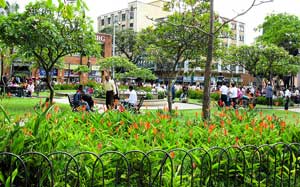
Steve and Pat Turney echo our sentiments about the active lifestyle to be found in Medellín. Pat refers to Medellín as “a city with a built-in weight-management program,” due to all the walking you can do. As an added bonus, Steve is convinced that the fresh, non-radiated food he gets from the farmers’ market has actually reduced his PSA level (and his likelihood of prostate cancer).
Diego and Kate Wall also call Medellín home. They make the 15-minute walk from their apartment to the local famers’ market every Sunday—and go home with a week’s worth of fresh produce for under $15. “Even the eggs are better here,” says Diego. “The shells are firmer, the yolk is firmer, and it’s bright orange in color. You can tell the chickens here are fed something better than the pellets they get back in the States.”
“I love having fresh tomatoes all year round,” says Diego of their new, healthier life in Colombia. Coming from the Midwest, he was used to waiting until late summer for the bounty, and then eating what he could and canning the rest. “Now I can get fresh vegetables any time of year.”
This dramatic change in lifestyle has worked wonders for the couple. Increased exercise, good, natural food, and the low-stress environment have all contributed to their improved well-being.
“Within the first six to seven months of living here, we each lost 10 pounds and kept it off—without even trying!” says Kate with pride.
It’s not just the active lifestyle. Eating more healthily is certainly no chore in Colombia. The canned soup aisle in the supermarket here consists of six cans, all imported from the U.S. Colombians make soup daily from scratch, with real food and no preservatives. When fresh vegetables, fruit, and chemical-free food is so plentiful, why would anyone want to eat something from a can?
The lower cost of living also leads many expats to work less here (if they have to work at all) leaving them with more time to enjoy the great outdoors all year long. Kate Wall attributes her decrease in stress to not having to work so much. “The lower cost of living in Colombia allowed me to leave my 60-hour-per-week, stressful job in the States and move to Medellín. Now I work much less, online, and from home.”
No More Medicines Needed in the Land of Pura Vida
By Jason Holland
“Since moving here I haven’t had arthritis in years,” says Robbie Felix of her healthy new life in Manuel Antonio, on Costa Rica’s Pacific coast. “The clean air in the rainforest, the ocean…it’s like breathing medicine. I’m very healthy for someone with a chronic illness. I surf. I walk on the beach. I exercise.”
Robbie, in her early 60s, has the chronic illness Lupus. But she found relief from her symptoms (including arthritis and skin allergies) after arriving in Costa Rica. And she’s not alone. Robbie is just one of the many expats who no longer needs a raft of medications since moving down here.
“My high blood pressure has come down almost completely,” says Nel Cameron, 68, who lives in Escazú, a suburb of Costa Rica’s capital, San José.
So what is it about Costa Rica that causes your blood pressure to plummet and your dependence on meds to go fade away?
There’s a phrase in Costa Rica, sort of the unofficial national motto: Pura Vida. It literally translates to “Pure Life,” but it’s more accurate to say “Life Is Good.”
It’s an attitude shared by most Ticos, as Costa Ricans call themselves. They value time with family and friends. They work hard, but you won’t find them sacrificing playing soccer with their kids at the park by staying late at the office. They know that a well-balanced life, where you spend time in your community or doing things you enjoy, is key to good health and wellness.
It makes for a low-stress lifestyle. And most expats find that, soon after arriving in Costa Rica, they adopt the Pura Vida way of life, too. They slow down. They get out of the habits they had for years when they were part of the daily grind. They enjoy coffee on their back porch, enjoying the scenic vistas of the Central Valley or Lake Arenal. Or breakfast with their toes in the sand with friends, after a long walk on the beach.
Reducing stress and learning to enjoy life is only one way expats find themselves improving their mental and physical health. Just about every Costa Rican town of any size has a feria, or outdoor farmers’ market, at least once a week. Most expats adopt the local habit of doing the majority of their shopping there. The price is right. With pineapples for $1, heads of lettuce for 75 cents, tomatoes for 50 cents a pound, and other bargains, you can load up on a week’s fresh fruits and vegetables for about $35. You also have fresh fish like snapper, tuna, or dorado (mahi-mahi), straight off the boat, for $5 to $6 a pound.
With these prices—and the abundance of fresh, whole foods—you can’t help but have a healthier diet. It’s common for expats to eliminate the need for some prescriptions. And lose significant weight—20…30…40 pounds or more—in the process.
Harry and Barbara Jones, a 60-something couple, live in Grecia, in Costa Rica’s Central Valley. They’ve found that living like the locals—shopping at the local farmers’ market for fresh fruits and vegetables, for example—allows them to cut their monthly budget to well under $2,000. Another benefit of their newfound healthy eating habits: “I’ve lost 30 pounds since moving down,” says Harry.
Diet is just one part of the equation. You have no shortage of options for exercise in Costa Rica, thanks to the warm, tropical weather year-round. On land, you can take long walks on the beach, trek through jungle, or hike vigorous trails to mountaintops with panoramic vistas. Watersports like surfing, standup paddle boarding, and kayaking are hugely popular on the coasts, with plenty of schools and instructors to help beginners of any age.
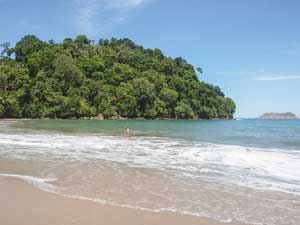
“One of the things we like is that it is quiet and peaceful. Its country living at its finest,” says Ian Douglass, 46, from Manhattan Beach, California, of his life in Dominical on Costa Rica’s southern Pacific coast. “Clean air, unprocessed food, good waves, natural beauty, and the beach. I think these are things we should be allowed to enjoy every day.”
In the beach areas, it can be hot and humid—too much for some, just right for others. But head to the Central Valley and you’ll enjoy cool mornings where you need a sweatshirt and afternoon highs in the mid-80s F, with little humidity.
Jeff and Allison Spencer, 60 and 58, respectively, were educators in Arizona before retiring early and moving to the Lake Arenal region, which features a consistent, spring-like climate.
“In general, I really enjoy the weather. The breeze keeps things cool and keeps the bugs away. Even on rainy days, it’s nice and cool. March to April it’s dry. But we do have a lot of rain during rainy season, usually a sunny morning and rainy afternoon—that’s typical. But I wouldn’t trade that for the heat and dust in Arizona,” says Jeff, who adds, “The great temperatures year-round allow us to enjoy kayaking, biking, and hiking whenever we want.”
Of course, just walking out your front door can provide a lot of exercise. Many communities in Costa Rica are also very walkable. If you live in a town in the Central Valley or in one of the many laidback beach towns, you can get around mainly on foot for trips to the grocery store, local restaurants, and the like. If you’re in more outlying areas, there is excellent bus service and cheap taxis, so there’s no need to depend on a car.
With all these factors, it’s no wonder that one of Costa Rica’s regions, the Nicoya Peninsula, was named one of the world’s Blue Zones by researchers. They discovered that locals live longer on average, thanks to a combination of diet, climate, and lifestyle. I can’t say you’ll live longer as an expat in Costa Rica. But you’ll certainly be healthier.
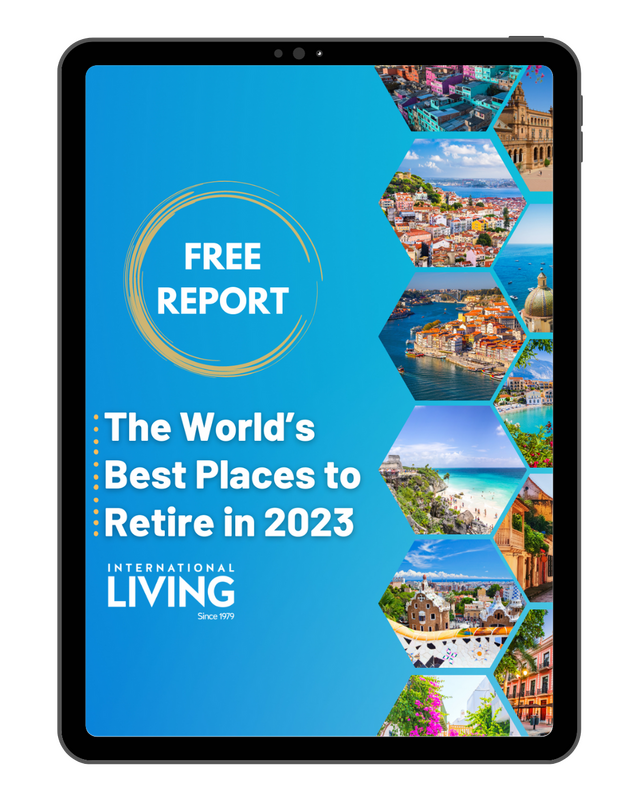
Get Your Free Report on the World’s Best Places to Retire:
Learn more about the best places in the world to retire in our daily postcard e-letter.
Simply enter your email address below to sign up for our free daily postcards and we’ll also send you a FREE report on The World’s Top 10 Retirement Havens, plus access to over 10 more free reports. Our gift to you, on our favorite destinations.
Related Articles
The World’s Best Places to Retire
5 Countries with the Best Healthcare in the World
5 Best Caribbean Islands to Live On… and 2 to Avoid
Upcoming Conferences
The Only 2024 Fast Track Panama Conference
If your dream retirement involves stunning beaches… lush green mountains… a warm climate with no hurricanes… first-rate healthcare… incredible value for money (a couple can live well on $2,200 a month)… and the World’s #1 Retiree Discount Program…
Join our Panama experts and expats in February and discover why Panama could be your perfect paradise.

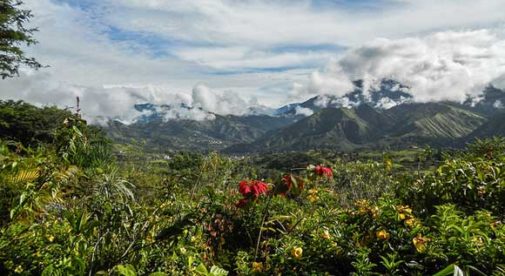
.png)